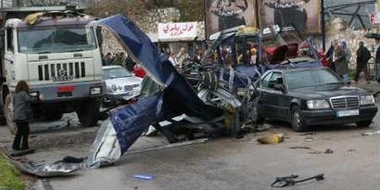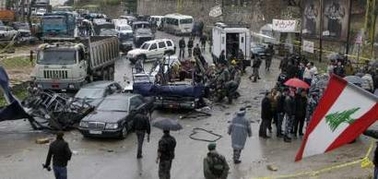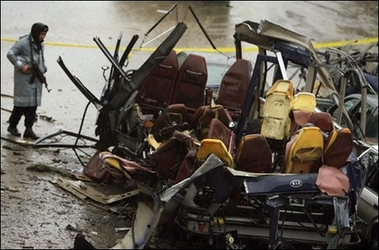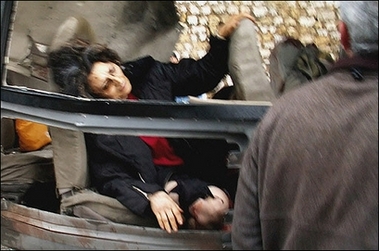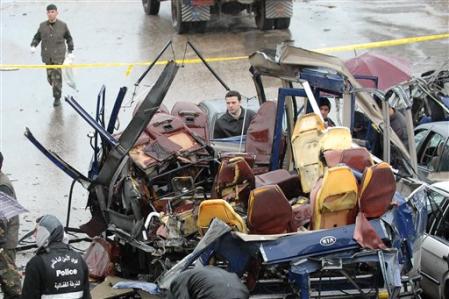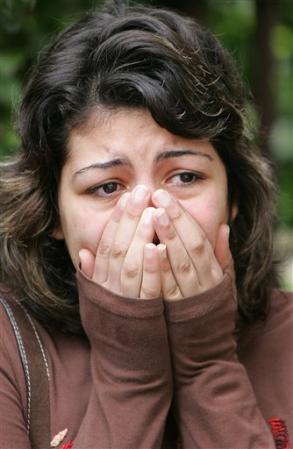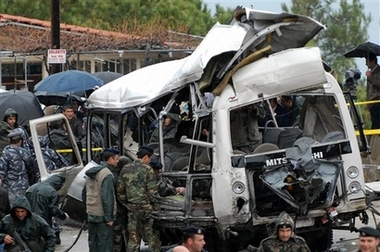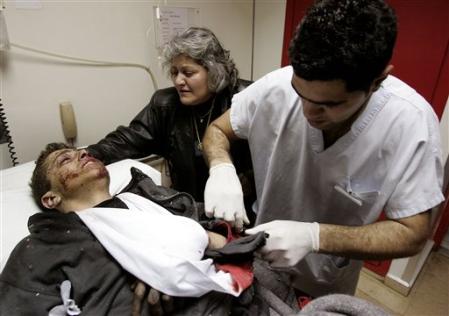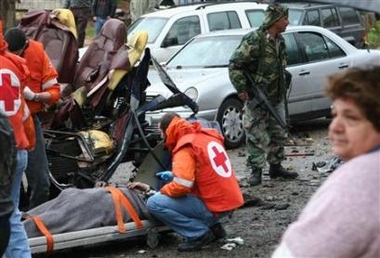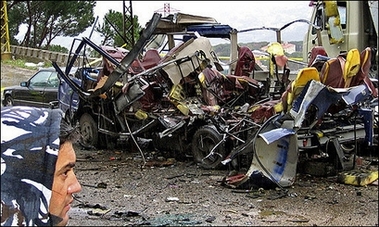 Khazen.org presents its deepest condoleances to the family of the innocent victims and martyrs of Lebanon Michel Attar and Laurice Gemayel. Pope Benedict XVI on Wednesday deplored the twin bomb attacks that claimed at least three lives near Beirut and urged Lebanon’s people and leaders to reject violence. "He entreats the Lebanese people and their leaders to unanimously reject violence and (work) at this tragic moment for national unity and the common good," The pope said in a cable to Cardinal Nasrallah Sfeir in Lebanon.The message, sent on the pope’s behalf by Vatican State Secretary Tarcisio Bertone, said Benedict had been "deeply pained" by news of the bus bombings Tuesday in a Christian area northeast of Beirut. AINALAK,LEBANON
Khazen.org presents its deepest condoleances to the family of the innocent victims and martyrs of Lebanon Michel Attar and Laurice Gemayel. Pope Benedict XVI on Wednesday deplored the twin bomb attacks that claimed at least three lives near Beirut and urged Lebanon’s people and leaders to reject violence. "He entreats the Lebanese people and their leaders to unanimously reject violence and (work) at this tragic moment for national unity and the common good," The pope said in a cable to Cardinal Nasrallah Sfeir in Lebanon.The message, sent on the pope’s behalf by Vatican State Secretary Tarcisio Bertone, said Benedict had been "deeply pained" by news of the bus bombings Tuesday in a Christian area northeast of Beirut. AINALAK,LEBANON
By Tuesday night, supporters of the besieged U.S.-backed government had accused Syria of planning the bombings.
This pine-shaded mountain village lies outside Bikfaya, the ancestral homeland and political stronghold of the Gemayel family.
Last week, former President Amin Gemayel visited President Bush at the White House, prompting rumors that he may have ambitions to seek office again. His son, Industry Minister Pierre Gemayel, was gunned down in November..
"I am raging with anger on the inside," said Elie Mbarak, 40, a businessman who paced at a hospital as surgeons operated on his sister. She was taking the bus from their hometown to go shopping. The bones in her chest were broken and her hair burned off.
"I don’t want my children to live through this. Lebanon is not for people like us anymore," said Mbarak, who wore a cross around his neck.
"They want us to emigrate, but we will stay here," said Rosette Gemayel, 44, a relative of the wounded woman. "If a civil war breaks out, I will fight. I will fight against all these traitors."
Memories of the civil war and fear that fighting will erupt again among Lebanon’s religious sects have been stirred by a political crisis that has sharpened sectarian tensions.
At the same time, an excruciating killing campaign has dragged on. Lebanese are not sure who is behind the attacks. Many blame Syria, which stationed troops and exercised a degree of control in Lebanon until forced by the international community to withdraw after Hariri’s death. The Syrian government has denied any involvement.
Against this backdrop, the attacks Tuesday seemed to indicate an escalation. Previously, there had been two types of bombings: assassinations of prominent politicians and journalists critical of Syria, and mostly symbolic strikes in unoccupied, usually Christian, areas.
Saad Hariri, head of the Sunni Muslim community and son of the slain former prime minister, urged people to turn out for his father’s commemoration despite the attacks. He said that many people would be taking buses to the downtown Beirut demonstration, and that the blasts were meant to terrorize would-be participants into staying home.
"The message is clear," Hariri told the Lebanese Broadcasting Corp. "They want to scare people."
On the mountain road where the buses were bombed, Hariri’s allies seemed more determined than ever to honor their dead.
"It will not scare us. I am sure Syria is behind it," said Charbel Gabriel, 50, who sells cars near the bombing site. "I am still determined to participate in the commemoration."
A Lebanese policeman stands near a destroyed bus at the site where bomb blasts tore through two buses in the village of Ain Alak, northeast of Beirut, killing at least three people as the deeply divided nation prepared to commemorate the murder of ex-premier Rafiq Hariri two years ago. The bombings in a mainly Christian area northeast of Beirut were the latest in a spate of attacks that have been blamed on Lebanon‘s former powerbroker Syria and came at a time of high political tensions in Lebanon.(AFP/Ramzi Haidar)
A wounded woman lies inside a destroyed bus at the site where bomb blasts tore through buses in the village of Ain Alak, northeast of Beirut. Bomb blasts tore through two buses in Lebanon, killing three people, as the deeply divided nation prepared to commemorate the murder two years ago of ex-premier Rafiq Hariri.(AFP)
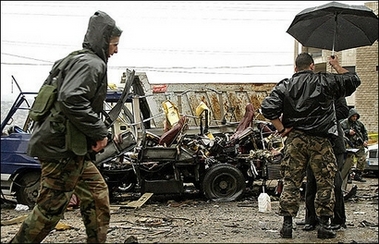
A Lebanese policeman stands near a destroyed bus at the site where bomb blasts tore through buses in the village of Ain Alak, northeast of Beirut. Bomb blasts tore through two buses in Lebanon, killing three people, as the deeply divided nation prepared to commemorate the murder two years ago of ex-premier Rafiq Hariri.(AFP/Ramzi Haidar)
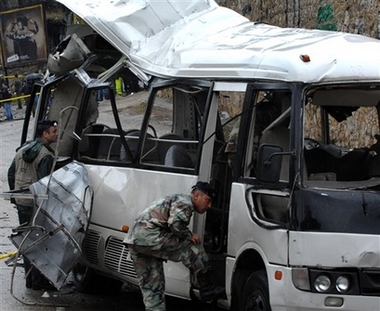
Lebanese soldiers secure the site where bomb blasts tore through buses in the village of Ain Alak, northeast of Beirut. Bomb blasts tore through two buses in Lebanon, killing three people, as the deeply divided nation prepared to commemorate the murder two years ago of ex-premier Rafiq Hariri.(AFP/Anwar Amro)
AFP via Yahoo! News – Feb 13 12:36 PM
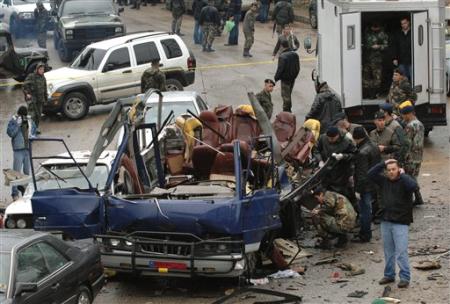
Lebanese soldiers inspect a damaged bus following two bomb blasts in the village of Ein Alaq, just south of the town of Bikfaya in Lebanon Tuesday, Feb. (AP/BELA SZANDELSZKY)
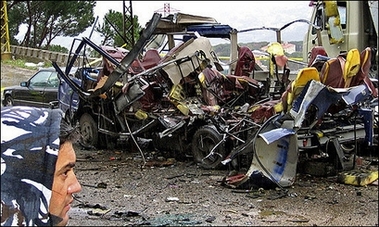
A Lebanese police man looks at the wreckage of a bus at the site where bomb blasts tore through buses in the village of Ain Alak, northeast of Beirut. Bomb blasts tore through two buses in Lebanon, killing three people, as the deeply divided nation prepared to commemorate the murder two years ago of ex-premier Rafiq Hariri.(AFP/Omar Kamal)
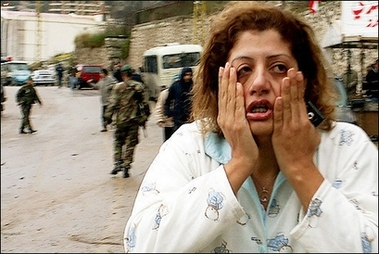
A shocked Lebanese woman flees the site where bomb blasts tore through buses in the village of Ain Alak, northeast of Beirut. Bomb blasts tore through two buses in Lebanon, killing three people, as the deeply divided nation prepared to commemorate the murder two years ago of ex-premier Rafiq Hariri.(AFP)
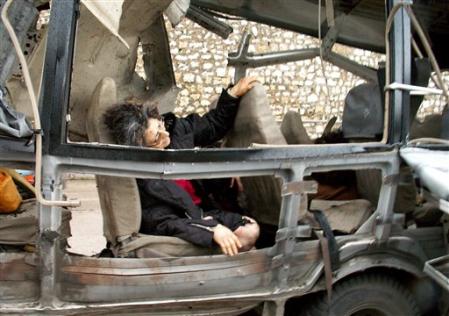
An injured Lebanese woman sits inside a damaged bus, waiting to get help from medics, in the village of Ein Alaq, northeast of Beirut, Lebanon, Tuesday Feb. (AP/RONI SHRABIYEH)
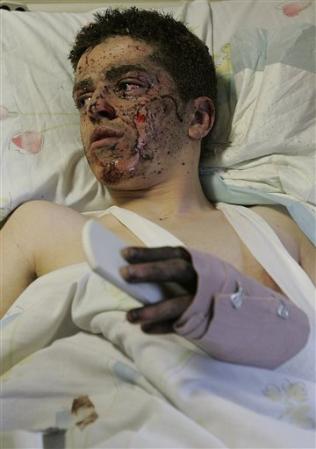
Alain Khoury, 18, who was injured by a bus explosion, lies on his bed at a hospital in Antelias town northeast of Beirut, Lebanon, Tuesday Feb. (AP/HUSSEIN MALLA)
Lebanese investigators examine a damaged bus following two bomb blasts in the village of Ein Alaq, just south of the town of Bikfaya, Lebanon Tuesday, Feb. (AP/MAHMOUD TAWIL)
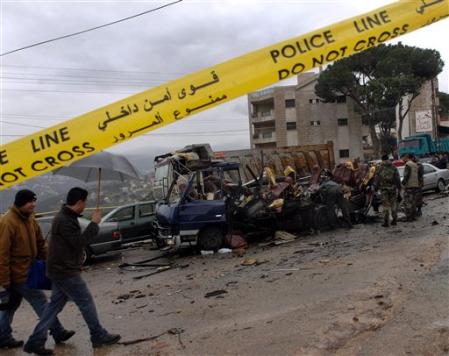
Lebanese walk by the scene of the two bomb blasts damaging buses in the village of Ein Alaq, just south of the town of Bikfaya, in Lebanon Tuesday, Feb. (AP/BELA SZANDELSZKY)
An university colleague of Michel Attar who killed by a bus explosion, grieves outside the hospital in Antelias town, northeast of Beirut, Lebanon, Tuesday Feb. (AP/HUSSEIN MALLA)
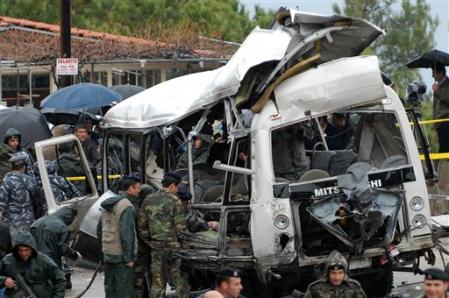
Lebanese soldiers examine a damaged bus following two bomb blasts in the village of Ein Alaq, just south of the town of Bikfaya, in Lebanon Tuesday, Feb. (AP/BELA SZANDELSZKY)
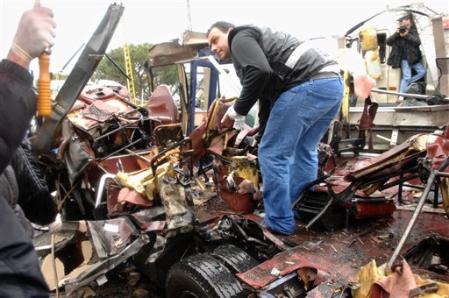
A Lebanese investigator examines a damaged bus following two bomb blasts in the village of Ein Alaq, just south of the town of Bikfaya, Lebanon Tuesday, Feb. (AP/MAHMOUD TAWIL)
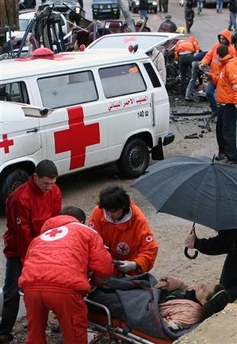
Lebanese Red Cross paramedics carry a wounded woman following two bomb blasts near the Christian mountain town of Bikfaya, north of Beirut, February 13, 2007. (Rony Said/Reuters)
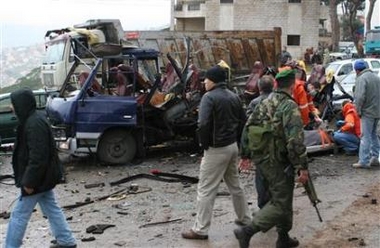
Lebanese Red Cross paramedics rush to the site of a bombed minibus near the Christian mountain town of Bikfaya north of Beirut, February 13, 2007. (Rony Said/Reuters)
Lebanese soldiers examine a damaged bus following two bomb blasts in the village of Ein Alaq, just south of the town of Bikfaya, Lebanon Tuesday, Feb. 13, 2007. A pair of bombs minutes apart tore through two buses traveling on a busy commuter highway Tuesday morning near a mountain town northeast of Beirut. (AP Photo/Mahmoud Tawil)
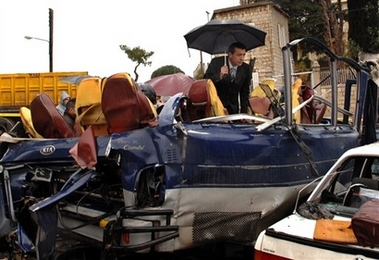
A Lebanese investigator examines a damaged bus following two bomb blasts in the village of Ein Alaq, just south of the town of Bikfaya, Lebanon Tuesday, Feb. 13, 2007. A pair of bombs minutes apart tore through two buses traveling on a busy commuter highway Tuesday morning near a mountain town northeast of Beirut. (AP Photo/Mahmoud Tawil)
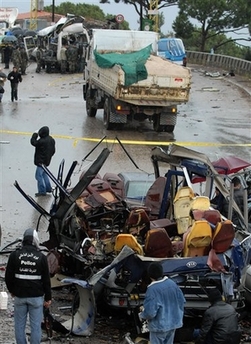
Investigators examine a damaged bus as Lebanese soldiers check the second bus, seen in the background, following two bomb blasts in the village of Ein Alaq, just south of the town of Bikfaya, Lebanon Tuesday, Feb. 13, 2007. A pair of bombs minutes apart tore through two buses traveling on a busy commuter highway Tuesday morning near a mountain town northeast of Beirut. (AP Photo/Mahmoud Tawil) A wounded Lebanese is rushed into a hospital after bomb blasts tore through two buses in the village of Ain Alak. The blasts killed three people, as the deeply divided nation prepared to commemorate the murder two years ago of ex-premier Rafiq Hariri. (AFP/Anwar Amro)
AP via Yahoo! News – Feb 13 5:31 AM
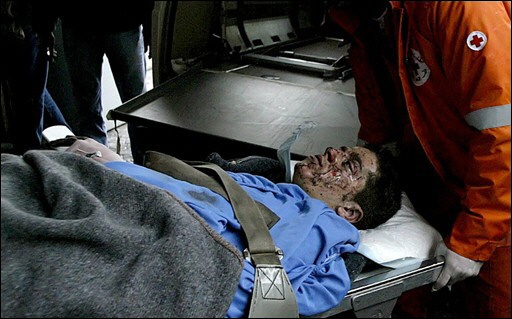
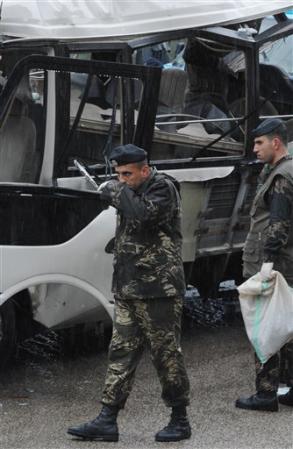
A Lebanese army officer walks by a damaged bus following two bomb blasts in the village of Ein Alaq, just south of the town of Bikfaya in the mainly Christian province of northern Metn, some 30 miles northeast of the Lebanese capital, Tuesday, Feb. (AP/BELA SZANDELSZKY)
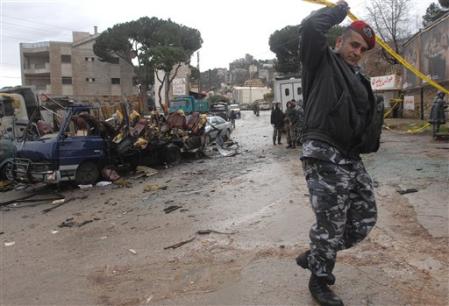
A Lebanese police officer leaves the scene of a damaged bus following two bomb blasts in the village of Ein Alaq, just south of the town of Bikfaya in Lebanon, Tuesday, Feb. (AP/BELA SZANDELSZKY)
AP via Yahoo! UK & Ireland News – Feb 13 4:41 AM
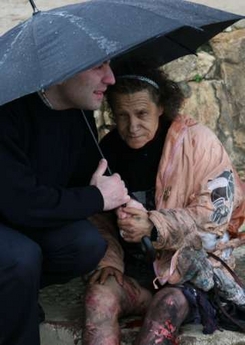
A Lebanese doctor, treats Alain Khoury, 18, who was injured by a bus explosion, at a hospital in Antelias town, northeast of Beirut, Lebanon, Tuesday Feb. (AP/HUSSEIN MALLA)
Lebanese Red Cross paramedics help a wounded victim following two bomb blasts near the Christian mountain town of Bikfaya north of Beirut, February 13, 2007. (Rony Said/Reuters)
